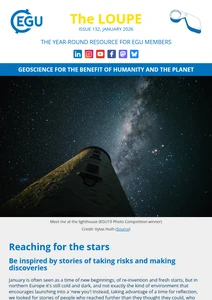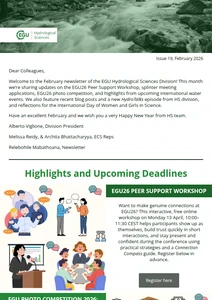President: Alberto Viglione
(Emailhs@egu.eu)
Deputy President: Maria-Helena Ramos
(Email)
ECS Representative: Melissa Reidy
(Emailecs-hs@egu.eu)
The Hydrological Sciences (HS) Division is concerned with all aspects of the terrestrial hydrological cycle (including precipitation, surface water, soil water, groundwater) from the pore scale to the global scale, and its relationships and interactions with the atmospheric part of the hydrological cycle. The division also covers the interaction between hydrology and geomorphology (e.g., erosion, sedimentation, groundwater systems), the relationships between hydrology and soils, as well as the interaction between the hydrosphere and the biosphere (e.g., ecohydrology, wetlands). The ways in which hydrological processes are observed, quantitatively computed, and forecasted are also addressed by the division. Management and operation of water resources by societies in various parts of the world is also within the division's realm.
The Hydrological Sciences Division (HS) has five main tasks:
- Organizing the hydrological part of the program during the annual EGU General Assembly
- Running its on-line open access journal: Hydrology and Earth System Sciences (HESS)
- Recognizing deserving colleagues in various stages of their careers with its Award program.
- Encouraging the interaction and active participation of young hydrologists within the hydrological community
- Circulating news, information, job adverts, announcements of opportunity or meetings that may be relevant to the hydrological community
Such tasks require considerable (voluntary!) input from many people, and offer plenty of opportunities to become actively involved.
To ensure that the sessions during the General Assembly cover our science as comprehensively as possible, there are currently ten Subdivisions, including a subdivision on general hydrology (monitoring and cross cutting issues). Distinct fields within the broad area of hydrology are covered. Each Subdivision Committee organises a set of oral, poster or PICO sessions to cover its field. The members of the Subdivision Committees meet during the EGU General Assembly and start preparing the draft programme for next year’s meeting in late spring/early summer. Membership of the committees of these Subdivisions is open: you can e-mail the Subdivision Committee Chair to request membership or you may directly join the meeting during the General Assembly to get involved in the Subdivision activities and in particular in the organisation of the programme, including proposal of sessions and volunteering as convener or co-convener (see overview of Programme Organisation and Convener Tasks).
You can also become involved in the Hydrology and Earth System Sciences (HESS) journal. In addition to submitting your best scientific work to HESS, consider that the journal needs both referees and members of its Editorial Board to cover a sufficiently broad spectrum of expertise to adequately handle all incoming papers. If you would like to become active as a referee or as an editor you may therefore consider informing any editor or Executive Editor of your wish.
The Division contributes to the EGU Awards & Medals programme that recognises every year eminent scientists for their outstanding research contribution and identifies the awardees as role models for the next generation of young scientists to foster geosciences research. In particular, members of the Division are invited to contribute to the nominations (deadline are every year on the 15th June, see here) for both the young and senior HS Division Awards and Medals (link).
The EGU offers a platform for young scientists to become involved in hydrological research, through sessions, social events and short courses at the annual General Assembly in April. Several activities are especially aimed for Young Scientists in the Hydrological Science, organised with the help of the Young Hydrologic Society.
Lastly, you are invited to share the news/information that may be of interest to the EGU Hydrological Sciences community, by sending a tweet to @EGU_HS or filling in the activity calendar webform.
Do not hesitate to contact the Division President or any Division Officer if you need any additional information on our activities!
Latest posts from the HS blog
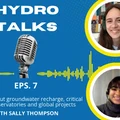
HydroTalks: Prof. Sally E. Thompson on ecohydrology, vegetation, climate change and working across continents
In episode 7 of the Hydrotalks podcast, our guest was Dr. Sally Thompson (Sally Thompson – the UWA Profiles and Research Repository). She is a Professor at the University of Western Australia, and the Co-Director of the Centre for Water and Spatial Science. Her research spans ecohydrology, surface hydrology, and Critical Zone Science, exploring how vegetation and ecosystems interact with water cycles under climate change. She is the EGU Henry Darcy medal recipient of 2026. You can check out the …
Read more
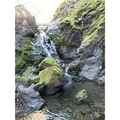
Can Machine Learning Help Us Monitor Streams?
Picture this: you’re hiking through a dry landscape when suddenly you hear it—the serene sound of a babbling brook. You round a corner and discover a small waterfall cascading into crystal-clear pools, surrounded by lush green ferns and wildflowers attracting buzzing bees. It feels like stumbling upon a secret oasis. These magical streams that appear and disappear with the seasons are called intermittent streams, and they’re more important than you might think. Why Intermittent Streams Matter Intermittent streams—waterways that flow …
Read more
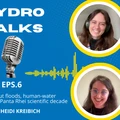
HydroTalks: Heidi Kreibich about Floods, Human-water Feedbacks, and the IAHS Scientific Decade Panta Rhei
For this month’s episode of HydroTalks, we’re thrilled to welcome Heidi Kreibich. She is head of the Section Hydrology at GFZ Helmholtz Centre for Geosciences and senior lecturer at the Geography Department of Humboldt-Universitat zu Berlin. Heidi is also president of the Natural Hazards division of the EGU and president of the International Commission on Human-Water Feedbacks in the IAHS. In addition, Heidi was chair of the Panta Rhei Scientific Decade during the last biennium of 2021-2023. You can check …
Read more
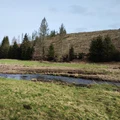
Prevent before repair: What a new hydrology-based index reveals about river ecological status
When I first began analysing agricultural pressures in German river networks, I expected the familiar story of nutrient loads, pesticide traces and differences between landscapes. What I did not expect was how narrow the ecological safe operating space has become for many rivers. Even small increases in agricultural pressure, especially from pesticides, reduced the likelihood of achieving good ecological status in a clear and consistent way. Seeing this pattern emerge across so many catchments made me look more closely at …
Read more
Recent awardees
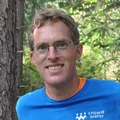
The 2025 Henry Darcy Medal is awarded to
Jan Seibert for pioneering work promoting Open Science with hydrological models, and building bridges between experimentalists and modellers, between physical and conceptual approaches, and to citizen science.
Read more

The 2025 John Dalton Medal is awarded to
Paolo D'Odorico for outstanding scholarship on water and its ties to environmental justice, energy, and food security.
Read more

- 2025
- Outstanding Student and PhD candidate Presentation (OSPP) Award
The 2025 Outstanding Student and PhD candidate Presentation (OSPP) Award is awarded to
Ahmed El-Azhari Groundwater Salinity Drivers in Arid Endorheic Basins: Insights from Hydrogeochemical and Isotopic Analyses in Bahira, Morocco
Read more

- 2025
- Outstanding Student and PhD candidate Presentation (OSPP) Award
The 2025 Outstanding Student and PhD candidate Presentation (OSPP) Award is awarded to
Anna Leuteritz Celerity, velocity and length of near-surface flow pathways: insights from tracer experiments
Read more

- 2025
- Outstanding Student and PhD candidate Presentation (OSPP) Award
The 2025 Outstanding Student and PhD candidate Presentation (OSPP) Award is awarded to
Anton Köhler An Analytic Element Method solution for multispecies reactive contaminant transport
Read more

- 2025
- Outstanding Student and PhD candidate Presentation (OSPP) Award
The 2025 Outstanding Student and PhD candidate Presentation (OSPP) Award is awarded to
Fredrik Schück Modelling floods, droughts and humans: A systematic review of hydrological hazard management in agent-based models
Read more

- 2025
- Outstanding Student and PhD candidate Presentation (OSPP) Award
The 2025 Outstanding Student and PhD candidate Presentation (OSPP) Award is awarded to
Kansei Fujimoto Development of a new satellite rainfall product HiDRED (Himawari Data Rainfall Estimation using Deep learning) and a fundamental study on its applicability to hydrological models
Read more
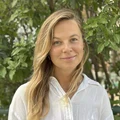
- 2025
- Outstanding Student and PhD candidate Presentation (OSPP) Award
The 2025 Outstanding Student and PhD candidate Presentation (OSPP) Award is awarded to
Malin Grosse-Heilmann Assessing the Effects of Climate Change on Durum Wheat Yields in Mediterranean Regions: A Water-Food Nexus Perspective
Read more
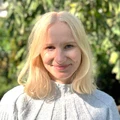
- 2025
- Outstanding Student and PhD candidate Presentation (OSPP) Award
The 2025 Outstanding Student and PhD candidate Presentation (OSPP) Award is awarded to
Malve Heinz From Field to Catchment: Evaluating the Hydrological Effects of Soil Organic Carbon Increases
Read more

- 2025
- Outstanding Student and PhD candidate Presentation (OSPP) Award
The 2025 Outstanding Student and PhD candidate Presentation (OSPP) Award is awarded to
Palok Biswas Normatively Robust Mitigation Policy to Equitably Distribute the Remaining Carbon Budget
Read more

- 2025
- Outstanding Student and PhD candidate Presentation (OSPP) Award
The 2025 Outstanding Student and PhD candidate Presentation (OSPP) Award is awarded to
Peter Wagener Evaluating Hydrologic Processes and Their Drivers for a Large Geographical Domain
Read more

- 2025
- Outstanding Student and PhD candidate Presentation (OSPP) Award
The 2025 Outstanding Student and PhD candidate Presentation (OSPP) Award is awarded to
Sahar Jannesarahmadi The Role of Wind Velocity in Saline Water Evaporation from Porous Media and Surface Salt Crystallization Dynamics
Read more

- 2025
- Arne Richter Award for Outstanding Early Career Scientists
The 2025 Arne Richter Award for Outstanding Early Career Scientists is awarded to
Frederik Kratzert for outstanding research in hydrological modelling and open science, particularly through Artificial Intelligence-based approaches in large-sample hydrology studies.
Read more
Current issue of the EGU newsletter
In our January issue, we are choosing to reflect on the ambition and risks of science - not a new year, new you, but rather a steady determination to discover, based on our existing, deep wells of curiosity. Catarina Aydar talks about how exploration sometimes goes hand-in-hand with tragedy with the story of the first attempt of a teacher, Christa McAuliffe, to go to space, onboard the ill-fated Challenger, whilst Sabrina Minnick, shares the triumph of Jacobus Kapteyn revealing the proper motion of the stars over 100 years ago. Astrobiological chemist Silke Asche talks about her work searching for life on other planets, and András Zlinszky shares his tips for your best EGU General Assembly yet! Also don't miss our on all the upcoming webinars, newest publications, a brand new EGU open access journal, and a job vacancy in the EGU Executive office in Munich, Germany!
All this and much more, in this month's Loupe!
Read more
Current issue of the HS division newsletter


















